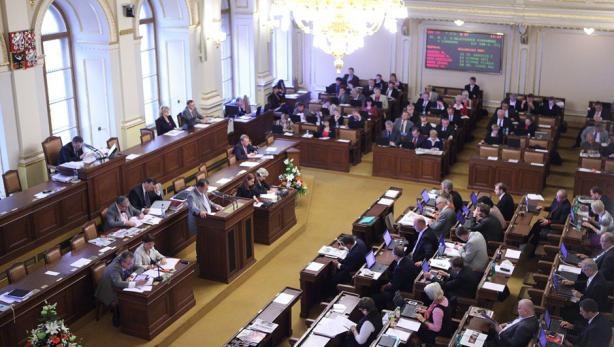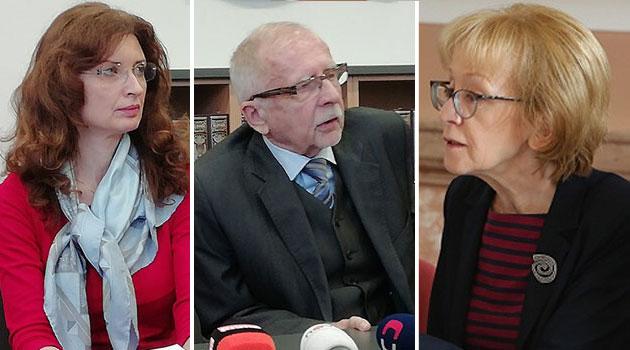Volunteer civil society members of Czech Govt Roma Council: Proposed welfare amendment violates guaranteed rights

An amendment to the law on aid to those in material distress currently awaiting a second reading in the Czech lower house does not respect the fundamental principles and rights that such welfare benefits are meant to guarantee, according to some of the volunteer civil society members of the Czech Government Council on Romani Minority Affairs. Romani community members and others on the Council point out that during the last six years, seven such amendments to the law on aid to those in material distress have been submitted to the legislature for consideration.
“… all the bills that involve such sanctions have been based on the conviction that this law can be bent to the will of those submitting such amendments,” reads the declaration by the volunteer civil society members of the Roma Council, who believe this law cannot under any circumstances be repurposed as an instrument for “re-educating” benefit recipients. These Council members believe that if this amendment were to be adopted, it would once again make the situation worse.
The declaration is signed by nine volunteer civil society members of the Council. News server Romea.cz is publishing it here in full translation.
Declaration by volunteer civil society members of the Czech Government Council on Romani Minority Affairs
A bill authored by Czech MPs Jan Bauer, Petr Fiala, Zbyněk Stanjura, Jana Černochová and others to promulgate an amendment to Act No. 111/2006, Coll., on aid to those in material distress, as well as several other laws, has been scheduled for a second reading in the lower house.
The amendment is aimed at the additional housing benefit and the allowance for subsistence and, if an individual has been fined for committing a misdemeanor and has yet to pay the fine, proposes that the amount of the fine be deducted from these benefits, specifically for the misdemeanors of not enrolling a child in compulsory education, neglecting the care of a child by allowing the child to miss more than 100 hours of compulsory school attendance during one semester without a valid excuse, or committing misdemeanors against public order, civil coexistence and property.
It is certainly not possible to assume the role of a blind defender of those who commit such misdemeanors, but the amendment to the law that is currently being discussed cannot be considered the optimal legal solution, especially since it does not respect the fundamental principles and rights such benefits are meant to uphold.
As can be seen from the debate on this law, during the last six years such amendments to the law on aid to those in material distress have been submitted seven times.
“… we support this bill being read a second time because certainly none of us here wants state social support benefits to be abused …” These words pronounced during that debate exactly express what the motivations of some MPs are for continually submitting newer and newer amendments to the law on aid to those in material distress.
Let’s leave aside the fact that, despite repeatedly submitting amendments to this legislation, some MPs continue to confuse the law on state social support with the law on aid to those in material distress. It is, however, impossible to ignore the fact that all the bills that involve such sanctions have been based on the conviction that this law can be bent to the will of those submitting such amendments.
It is also not possible to defend this intention with reference to the state’s inability to fulfill Government measures that have already been approved, as confirmed by these words of a Communist Party for Bohemia and Moravia (KSČM) MP: “The KSČM supports the passage in the first reading of this amendment from MP Bauer and his colleagues who have submitted it regarding the law on aid to those in material distress. I say this because it is also the way we have chosen to respond to what we said in the Committee on Social Policy, where six ministries, except the Ministry for Regional Development, have so far more or less done nothing to initiate the ‘15 Measures to Combat Poverty‘. You may have had, or you do have, information from the last tripartite session that 98 % of those measures were termed unfulfilled, unfulfilled, unfulfilled.”
What is more, the bill has been submitted with the awareness that it may clash with a right of which the submitters are most probably cognizant, especially since one, during the “defense” of the amendment, commented in the following words: “I will try to shorten it, maybe it’s worth it – risk yields profit, but sometimes loss.”
An amendment to a law, though, cannot possibly be submitted as a “risk” through which I, as a lawmaker, grimly take a stand against the meaning and objectives of a legal norm.
Let’s recall that the law on aid to those in material distress must be comprehended as directly implementing Article 26, paragraph 3 and Article 30, paragraph 2 of the Charter of Fundamental Rights and Freedoms, i.e., the right to enjoy adequate material security during unemployment. In other words, under no circumstances is this legislation an instrument for the “re-education” of these beneficiaries, which is what those submitting it claim to want to achieve.
What is even more painful is the fact that some MPs are assuming the role of defending those whom they call “decent people” and are repeatedly intensifying hatred in society against those who draw welfare benefits. Lastly, it is not possible to consider these alleged concerns about the deteriorating behavior of the impoverished, or even the alleged concerns about welfare abuse, to be legitimate aims of the amendment submitted.
When it comes to abusing welfare, those submitting this amendment and its quiet defenders seem, with a significant dose of arrogance, to be excluding the option for welfare disbursals to be legally audited. Today there are lawful procedures in place already to prosecute such behavior and strictly control welfare abuse. The question of abuse, therefore, cannot be perceived as implying the non-existence of lawful approaches to addressing it.
There do not exist any sanctions for those who incite the abuse of benefits, however. Those submitting this amendment are attempting to incorporate sanctions from other norms into this one law in particular, the law on aid for persons in material distress, but the already-adopted legislation certainly is not meant to serve the purpose of transforming such benefits into a source of income for the municipalities that are empowered to adjudicate misdemeanors and levy fines, nor is upholding the right to material security supposed to lead to disproportionate restrictions on the right to enjoy basic living conditions (for reasons other than those stipulated by law). A concrete solution for achieving the payment of fines levied against those who have committed misdemeanors surely cannot deviate from the fundamental framework of the Constitution, but this bill amending the law on aid to those in material distress does just that, and if it is adopted it will make the situation worse, as evidenced by all of the previous proposals for amendments to this particular law.
Jan Husák
Alena Drbohlavová Gronzíková
Gwendolyn Albert
Čeněk Růžička
Zdeněk Guži
Tomáš Ščuka
Vladimír Čermák
Alica Sigmund Heráková
Martin Kaleja
